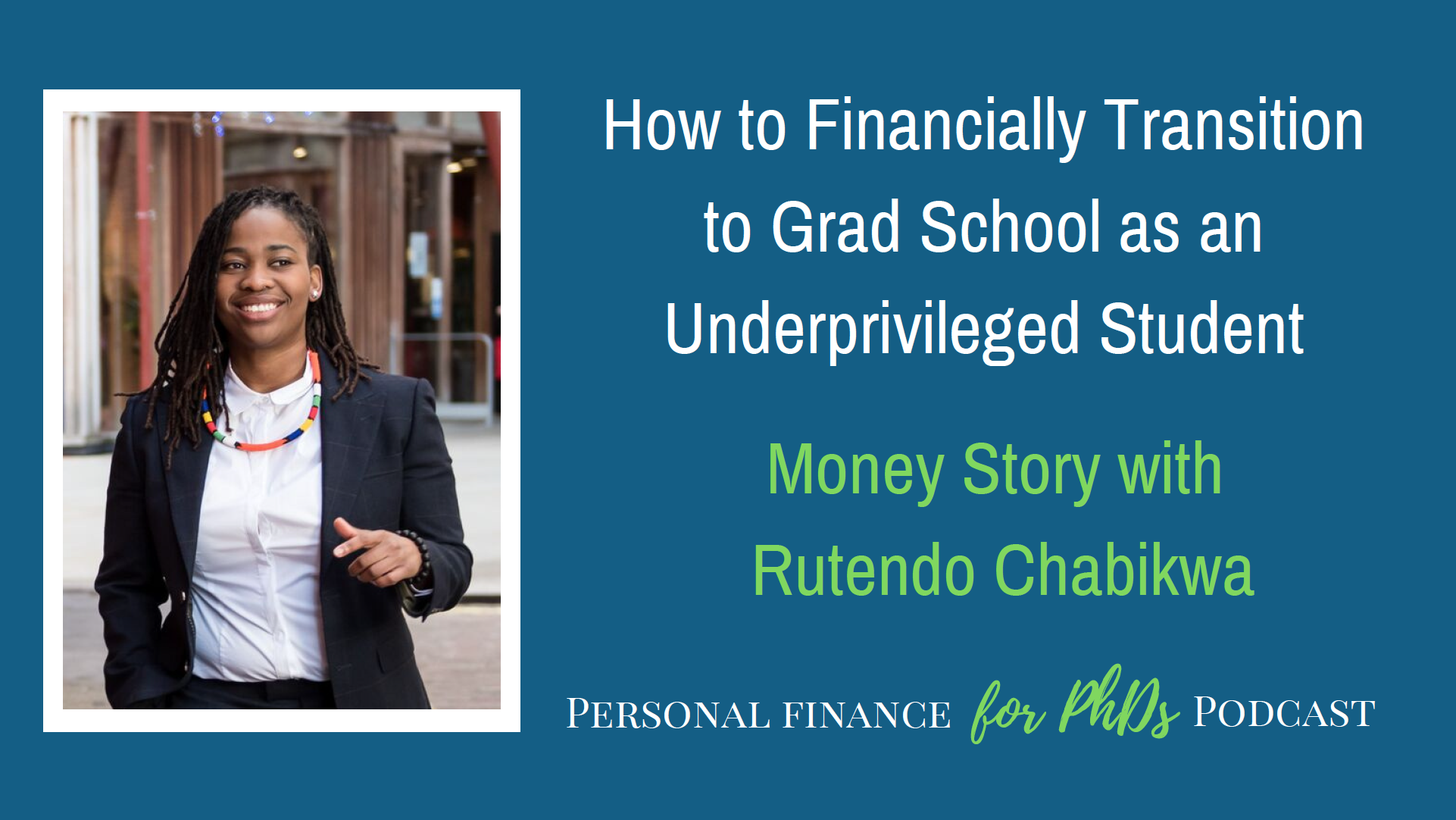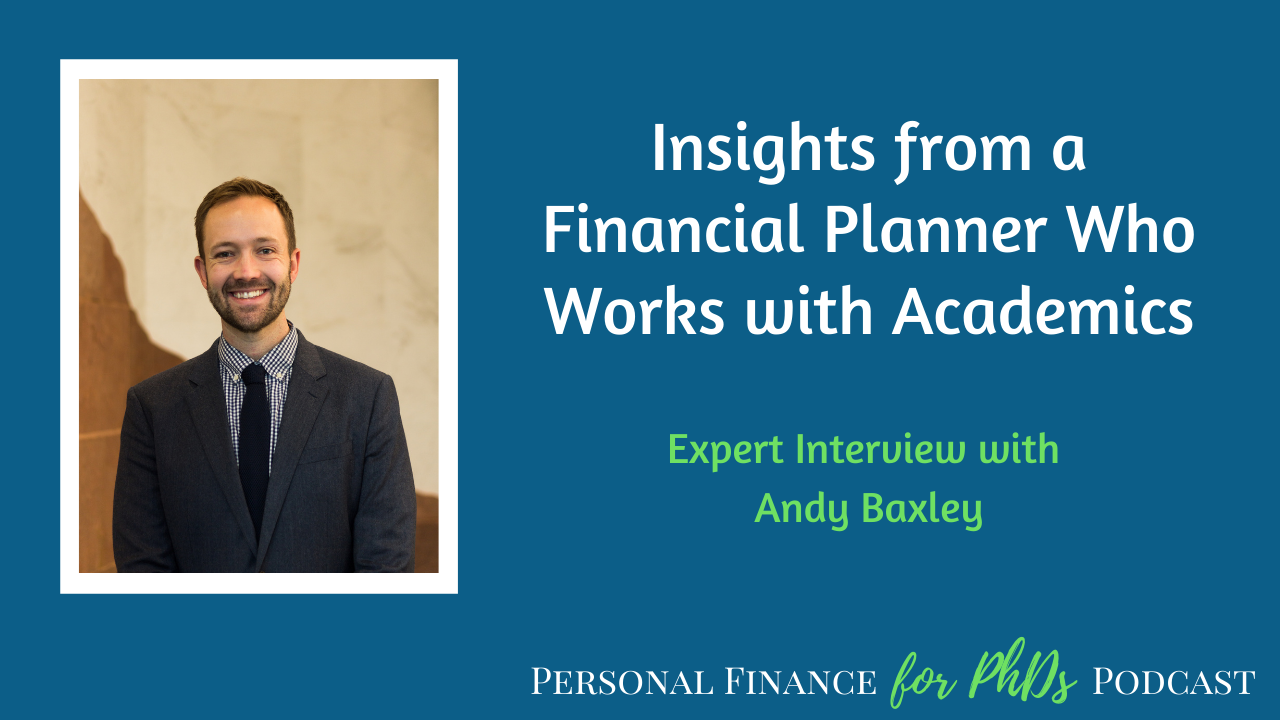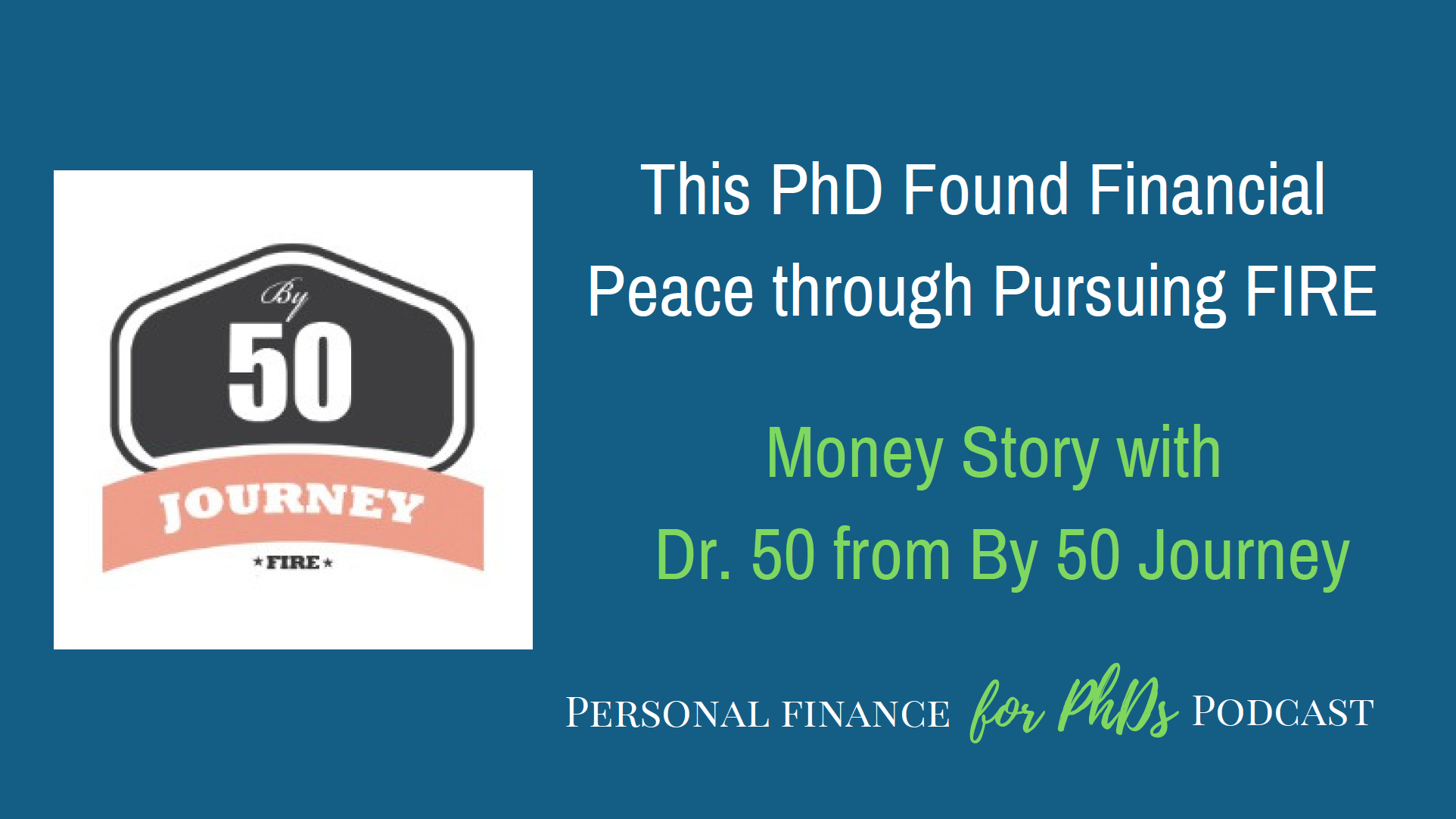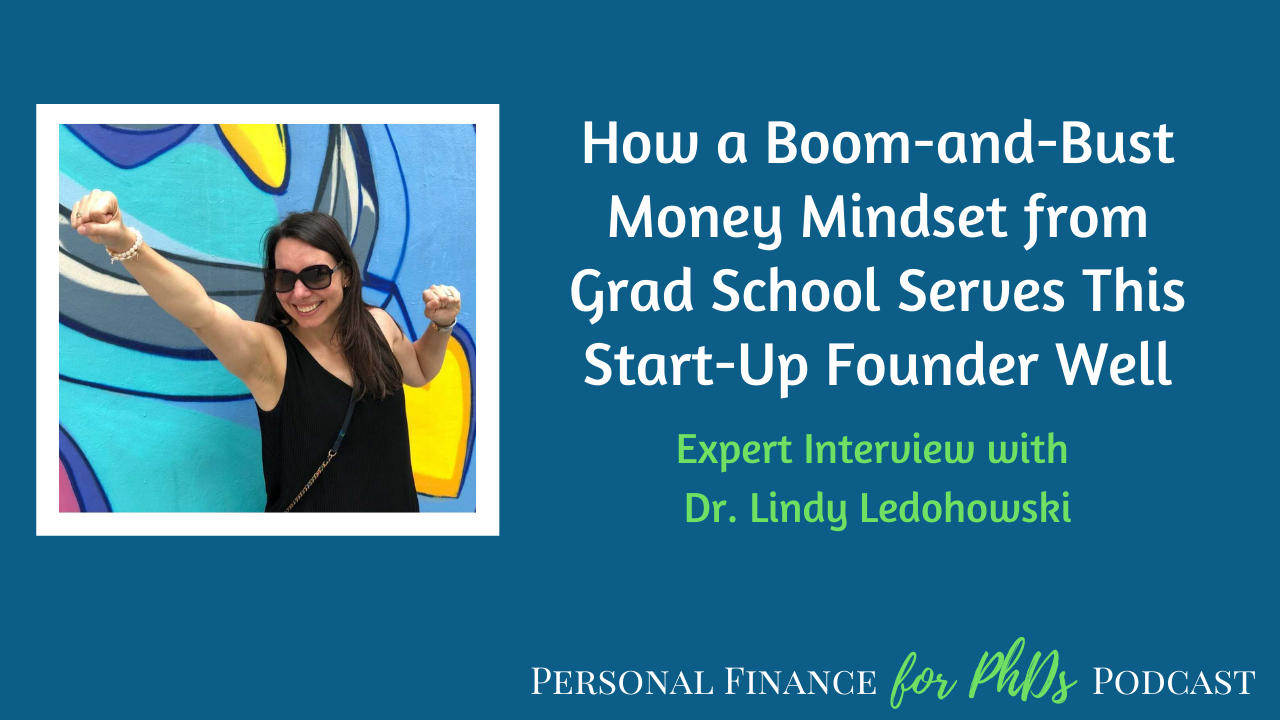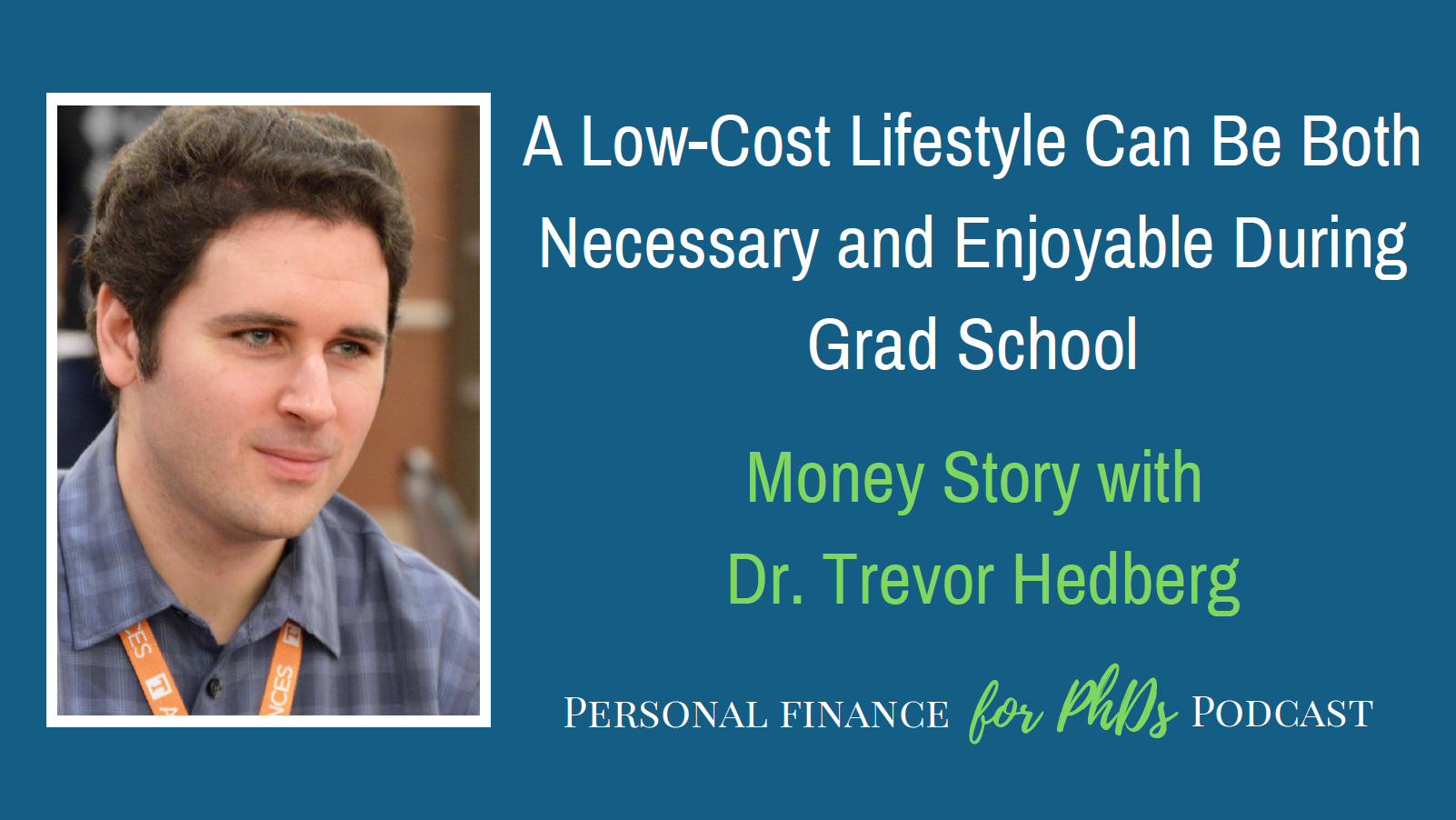In this episode, Emily interviews Dr. Veronika Cheplygina about the differences between how universities in the Netherlands and the US financially support their PhD students. In the Netherlands, PhD candidates (beyond the master’s level) are full-time employees under a 4-year contract that specifies their pay and benefits. It’s a secure position with only slightly lower pay than other types of positions. Veronika explains the financial and psychological benefits of this system and describes her lifestyle while she completed her PhD, which included purchasing a home. Prospective PhD students who are interested in doing their PhDs in the Netherlands should listen through to the end of the episode for application advice.
Links Mentioned in this Episode
- Find Dr. Veronika Cheplygina on Twitter
- Related Episodes
- The Academic Society: Grad School Prep
- Personal Finance for PhDs: Community
- Personal Finance for PhDs: Podcast Hub
- Personal Finance for PhDs: Subscribe to the mailing list
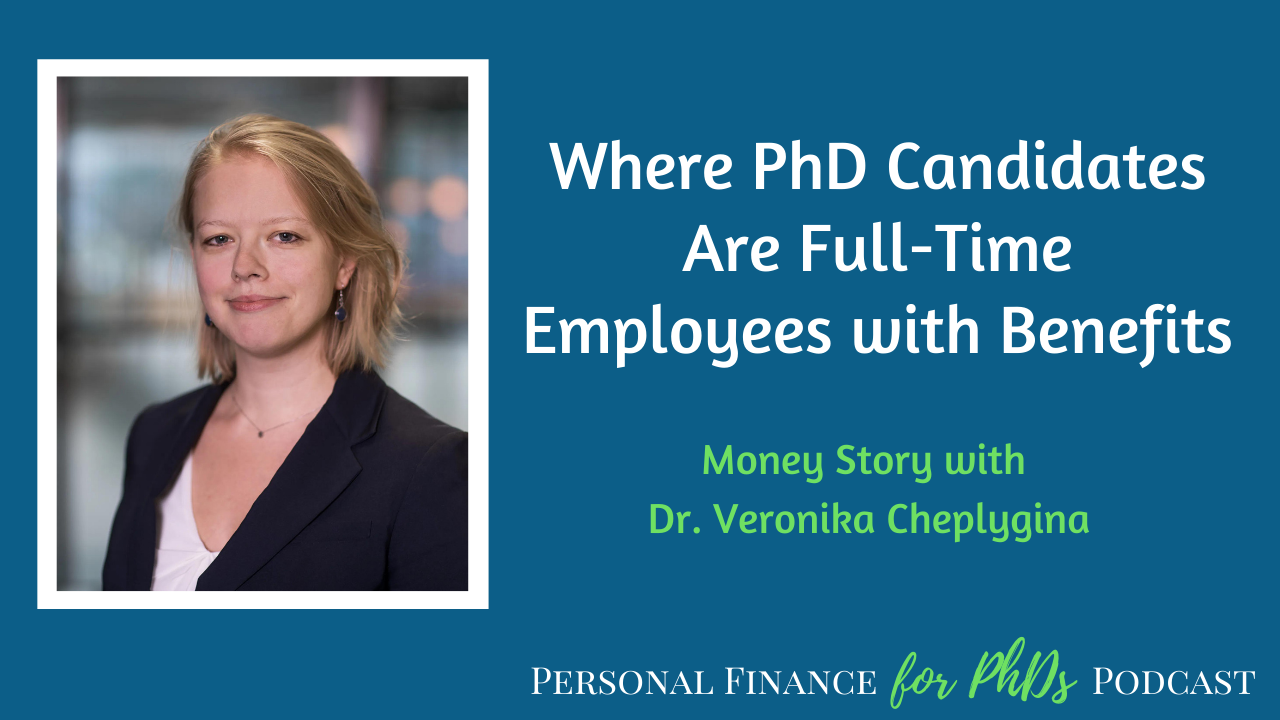
Teaser
00:00 Veronika: You know, when I was doing my PhD and I saw this PhD Comics for the first time, I didn’t recognize the whole situation of like people hunting for free sandwiches. It’s not a lot compared to industry, but it’s also decent. And you can sort of take care of your basic needs.
Introduction
00:24 Emily: Welcome to the personal finance for PhDs podcast, a higher education in personal finance. I’m your host, Dr. Emily Roberts. This Is season nine, episode two and today my guest is Dr. Veronika Cheplygina who holds a PhD in computer science from Delft University of Technology in the Netherlands. Veronika and I explore the differences between how universities in the Netherlands and in the US financially support their PhD students. In the Netherlands PhD candidates beyond the master’s level are full-time employees under a four year contract that specifies their pay and benefits. Veronika explains the financial and psychological benefits of the system and describes her lifestyle while she completed her PhD, which included purchasing a home. This is the perfect time of year for prospective PhD students in the US to consider broadening their search to include universities in the Netherlands and other countries with similar funding models.
01:24 Emily: On June 6, 2021 at 4:00 PM Pacific, I’m conducting an interactive workshop on choosing the optimal financial goal for you to work on right now, whether to save up cash, invest or pay down debt. I’m a firm believer that you should work on only one or a minimal number of financial goals at any given time, especially when you have a limited income like while in graduate school or a post-doc. Prior to the workshop, you’ll prepare your balance sheet, which is a record of all of your assets and all of your liabilities.
01:56 Emily: During the workshop, I’ll present my eight step financial framework, which I developed specifically for early career PhDs. I’ll show you how to break down your balance sheet to determine which step in the framework you’re currently on and what financial goal I suggest that you work on next. This workshop is for PhDs at all career stages, from rising graduate students through to PhDs with real jobs who are members of the Personal Finance for PhDs Community. If you’re not yet a member, you can easily join the community at PFforPhDs.community, and find details about the event under the course title, the Wealthy PhD workshops. If I get a good response from this first workshop on my financial framework, I’ll plan more of these live workshops for community members, which will be deep dives into money mindset, investing, debt, repayment, cash savings, and cashflow management. Sign up for the community today pfforphds.community, for access to the workshop on June 6th and much, much more great content.
Book Giveaway
03:05 Emily: Now onto the book giveaway contest. In May, 2021, I’m giving away one copy of “Bad With Money: The Imperfect Art of Getting Your Financial Sh*t Together” by Gaby Dunn, which is the Personal Finance for PhDs Community book club selection for July, 2021. Everyone who enters the contest during may will have a chance to win a copy of this book. Today is the last day to enter. The Bad with Money podcast was first recommended to me by one of the participants in my program, The Wealthy PhD. I think it’s going to generate a lot of great discussion in the book club. So please consider joining us pfforphds.community. If you would like to enter the giveaway contest, please rate and review this podcast on apple podcasts, take a screenshot of your review and email it to me [email protected]. I’ll choose a winner at the end of may, from all the entries you can find full instructions pfforphds.com/podcast. Without further ado, here’s my interview with Dr. Veronika Cheplygina.
Will You Please Introduce Yourself Further?
04:09 Emily: I have joining me on the podcast today, Dr. Veronika Cheplygina. She’s currently an assistant professor in the Netherlands, and she’s actually going to teach us today how the path to the PhD in the Netherlands compares to the path to the PhD in the United States, which of course I can represent that position. I think this will be really interesting to our American listeners, listeners in other countries, to compare these two paths, especially for anyone who has not yet embarked on the PhD. But I also think it’s going to have value for people who are already in graduate school in the United States, because there’s a very different view of graduate students there that we could really benefit from adopting, to a degree. We’ll see where the conversation goes. Veronika, thank you so much for joining me and will you please tell the listeners a little bit more about yourself?
05:01 Veronika: Thank you so much for having me it’s a pleasure to be here. As you said, I’m currently an assistant professor at Eindhoven University of Technology. My background is in computer science. I did all of my degrees in Delft, which is a different university of technology, also in the Netherlands. This was followed by, I got my PhD in 2015, followed by a two year postdoc and then, the tenure track, which I’m currently doing now. I am however, also leaving my tenure track in favor of a tenured associate professorship in Denmark, in Copenhagen, where I’m starting in February, 2021. I think that sums it up.
Overview of the Path to the PhD in the Netherlands
05:49 Emily: Congratulations on the new position and the upcoming move. We’re recording this in December, 2020, so I think you’ll have completed that by the time this is out so wonderful. Let’s get an, a quick overview of the educational path to the PhD in the Netherlands. Let’s start at the bachelor’s level: how much time does it take, how is it funded? Would you please answer that?
06:15 Veronika: Sure. Usually for the university level, there’s a three year bachelor program. It is formally separated from the master’s programs, which can be one or two years, but I think in practice, usually universities offer matching masters for different bachelor programs. I think most students end up doing the matching masters. It’s rather usually that the bachelor’s and the master’s are done together in five years or so, then that the master’s is as part of graduate school as in the US.
06:52 Veronika: And then after master’s, some students may go on to do a PhD, which would be typically a four year full-time trajectory. I think it’s different from the US in that you don’t really have a lot of courses anymore, as you would have had the research component in your master’s. Perhaps you might do some career development courses and such, or like an in depth summer school. From the time you’re, well at PhD researcher, I should say you were actually a university employee, and I think that makes a big difference for the experience.
07:36 Emily: Yes, absolutely and we’ll get into that quite a bit more. Then what about the funding? So you just said at the PhD level for the PhD training, you’re a full-time employee. What’s going on with the bachelor’s and master’s equivalent earlier than that? Is that funded by the student? Is it funded by the state? How’s that?
07:56 Veronika: The bachelors and the masters is a combination of the student and the state. I think the current tuition fees are around, for a domestic, and by domestic, I mean European union plus people with an eligible residents permit, that would be about 2000 euros a year in tuition. And the government contributes to this for the universities. So universities get funded centrally depending on the number of students there. I think the fee for non-EU students is quite a bit higher, but still, probably not at the level of many US schools. Then for the PhD, it’s an employment position which needs to be funded beforehand. As professor, you would need to acquire some kind of grant from a funding agency. And if you have that guarantee that you have this financing, then you can advertise a position. As a starting assistant professor, if you don’t have any kind of startup package from the university or already a grant on your own, you cannot say I’m recruiting grad students. Yu might have a master’s students will, of course need, will need to do a research project, but the PhD students, PhD researchers rather, you would need to finance yourself.
09:37 Emily: So to draw a contrast with the system in the US, it seems like for you all at the bachelor’s and master’s level, that’s where people are really viewed as students, right? You’re a learner you’re there to consume the product of the university and develop yourself, as a scholar. And it’s relatively inexpensive compared to here. There’s a big, big, big distinction between the master’s level and the PhD training level before you’ve actually completed your PhD in that it’s treated as a full-time job for your position and you’re going to finish in that time, it sounds like. Does anybody ever go over that amount of time or is it very firm? You’ve got four years you’re going to finish.
10:21 Veronika: Well, you get your salary for four years, unless there have been some special circumstances. For example, if you would take a 80% full-time working hours, you probably would have a longer time. Your salary will stop after that. It doesn’t mean you will necessarily defend your thesis in that time, but most people do aim to submit within then. Of course, this doesn’t always happen depending on your personal circumstances, et cetera, but I think it is doable in four years, given that you don’t have lots of courses and teaching, you would be required to help out a little bit in the department, but that’s not your main occupation. I do have to of course say that this is based on my model of how I experienced things, and I’m sure there are also departments that try to deviate from this, but this is how it should be and how I’ve seen it work in several places.
11:23 Emily: I see. Yeah, it seems like the contrast here, I guess, is that you have the opportunity to be paid at the master’s level. If you’re already, typically, if you’re already enrolled in a PhD program, you’re going through, what would be your master’s. You have the opportunity to receive a stipend usually during that time, but it’s not much. I’m curious about how much in the Netherlands, the PhD students or trainees, you know, PhD employees, PhD researchers are being paid compared to what’s enough to get by on, because definitely here, it’s a question mark, whether you’re going to be above or below that line as still a graduate student. How is the pay compared to if you had a full-time job that wasn’t PhD training?
12:11 Veronika: I think it’s a little bit less than, so for example, for, for me in computer science, industry jobs would be paid a little bit more. I think, compared to some other jobs, maybe straight after master’s, it’s not that much of a difference. I looked up, there are salary scales for these PhD positions, I looked it up just before, and it’s about 2,400 euros, before tax for the first year of the PhD. And it’ll go up to like 3000 to the last year. Of course the amount of after tax will depend on several other issues, like if you own property, et cetera. I think it should be, definitely if you’re sharing a living space with somebody else, it should definitely be okay. When I was doing my PhD and I saw this, PhD Comics for the first time, I really didn’t recognize myself…I didn’t recognize the whole situation of people hunting for free sandwiches everywhere. It’s not a lot compared to industry, but it’s also decent and you can sort of take care of your basic needs.
13:39 Emily: Yeah, I think that’s maybe the most impactful statement you could make in terms of to the credit of the system that you have there, is that it does not feel like what’s going on in PhD Comics. That’s wonderful.
Psychological Benefits to Being Treated as an Employee during the PhD
13:51 Emily: Okay, so you’ve said that once you get to the PhD candidacy stage, you’re a full-time employee of the university. What do you think is the psychological benefit of being viewed and legally treated as an employee versus as a student, like in the earlier stages? Let’s leave aside the financial for now, but just the psychological,
14:15 Veronika: I think it’s a good thing that you are in the same kind of position as your supervisors. I mean, you have, even though they will, of course be in the higher salary scale, you kind of have the same rights and I think that makes for a more equal playing field. Also several things you would not really necessarily need your supervisor’s permission for. Of course, it’s good if you inform them if you are ill or so, but actually that kind of thing would be arranged centrally by a party outside of the university. It just feels like you’re less dependent on your supervisor in personal matters. There’s just a bit less things to worry about. You can concentrate more on doing your job, your research and your life outside it.
15:16 Emily: Yeah. I’ve actually been reflecting on this recently. I had another podcast interview within the last few weeks and I believe it will be published recently before this one. It was with Laura Frater and she said something in that interview that’s really stuck with me since then, which is to not view yourself as a student while you’re pursuing your PhD. Because, and this is my interpretation of what she was saying, if you view yourself as a student, you sort of have an out for doing normal, like adulting things, like taking care of your finances and maintaining your relationships and keeping your body and mind healthy and so forth. Because we think of this, in the US we think of being a student, like being an undergraduate student as this just like magical period, when all you have to focus on is your education and no time passes and you stay healthy and everything’s wonderful, which is realistically not at all the case, especially when you do this for five, 10, whatever years into your twenties and thirties. I think that merely that switch alone of like, no, I literally am a full-time employee of this university – I’m receiving benefits, I have decent pay, would be a massive sort of, it’s like a graduation out of adolescence, when you’re not being considered a student anymore. That’s how I’m thinking about it. Does that strike a chord with you at all?
16:41 Veronika: That’s very true. I think generally, I tried to limit my hours also during my master’s, but it would definitely be the case I would study in the evenings and weekends, whenever. I think once I started this job, I would just come to the office between 8:30 and 5, which is when my supervisors were there. I just assumed that that was normal. I didn’t have like homework in the weekend and because I was in a small lab and I didn’t really have other PhD students to compare to, I didn’t really realize that people were maybe working on their projects the whole time. For me, there was no expectation to do this. This is definitely something that gets deviated from in some labs. But indeed I think just the realization you’re getting paid to do research for 40 hours a week, it’s also in your contract, that that helps with drawing a boundary there.
17:50 Emily: That actually reminds me of, I did a post-bac fellowship, so a year between when I finished undergrad and when I started graduate school, I did a post-bac fellowship at the National Institutes of Health. And it was a very different feel of an environment than a university feel, at least in my corner of that. People did work, I don’t know if it was 40 hours, but it was daytime office kinds of hours, maybe a little bit longer, that I could see. And I didn’t feel pressure to be staying super late. I would come in for eight or so hours a day, do my work, go home. Really, I was able to have some pretty good work-life balance during that time, which was not at all what I experienced during graduate school, where there was much more pressure to be working longer and just be doing a lot more. It sounds like more of a kind of professional environment rather than an environment that’s focused on the training or the trainee situation. Does that make sense?
18:48 Veronika: Yeah, that sounds that’s consistent with my experience
Commercial
18:54 Emily: Emily here for a brief interlude. This announcement is for prospective and first year graduate students. My colleague, Dr. Toyin Alli of The Academic Society offers a fantastic course just for you called Grad School Prep. The course teaches you Toyin’s four step Grad Boss method, which is to uncover grad school secrets, transform your mindset, up-level your productivity, and master time management. I contributed a very comprehensive webinar to the course titled “Set yourself up for financial success in graduate school”. It explores the financial norms of grad school and the financial secrets of grad school. I also give you a plan for what to focus on in your finances each season of the year that you apply to and into your first year of grad school. If this all sounds great to you, please register theacademicsociety.com/Emily for Toyin’s free masterclass on what to expect in your first semester of grad school and the three big mistakes that keep grad students stuck in a cycle of anxiety, overwhelm, and procrastination. You’ll also learn more about how to join grad school prep, if you’d like to go a step further again, that’s theacademicsociety.com/Emily for my affiliate link for the course. Now back to our interview.
Labor Contracts for PhDs
20:21 Emily: You mentioned earlier that there there’s a contract, like there’s a labor agreement for people pursuing PhDs. What are some of the elements of that contract?
General Benefits
20:31 Veronika: It’s the same labor agreements basically for all people in academic research. There’s a salary scale that corresponds to the kind of level you’re working at. That’s a different scale for PhDs. In comparison, so I told you that last year a PhD would get 3000 before tax per month, as an assistant professor, who’s just starting and you would get, I think 3,700. So it’s quite a flat ladder. There’s also a pension buildup. I have to confess that I haven’t really looked into how it’s done because I kind of trust that it’s done well, so it’s not something I haven’t had to worry about.
21:23 Veronika: The number of hours that you work and the number of vacation hours, you can take are fixed in there. You can also trade some vacation hours for some other benefits, like for example, extra pension. And then you get sort of like a tax advantage. There’s maternity and paternity leave, 16 weeks for maternity leave. And for paternity, I think it’s five days at full pay and then you can take a number of weeks off at lowered pay. There’s also a sick leave. So I think you can be something like 40 weeks at full pay if you need to, and then also longer at a lower pay. Lots of things like this. Basically life things that can come up, there’s usually a provision for.
22:29 Emily: Yeah. I think that must sound like a dream to a lot of PhD students and maybe even postdoc fellows right now who are in the US who are not treated as employees, or at least not as full-time employees of the university and just to have those benefits spelled out explicitly. It’s very patchwork here. In some places, maybe especially if you’re covered by a contract that’s been negotiated by a union, it can be very clear. I don’t think the benefits would be as high as that because just in the US we don’t get as much leave and so forth, but they would at least be clear.
23:03 Emily: But in many, many, many places, it’s not at all clear what your benefits would be, and it’s not until as an individual you come on to, okay, well, I’m pregnant, so I need to figure out what the maternity leave is going to be, or, okay, I need to take a leave of absence because I’m ill — I have no idea am I going to be paid? Unless you’re covered by probably a union contract, you probably wouldn’t know that until you actually encounter the situation, what the benefits might be. I think that clarity is just so, so helpful. And even on the vacation, like that’s even as a smaller issue, but something everyone encounters every year. That often has to be just negotiated one-on-one with your advisor and sort of oftentimes completely up to that person, whether or not they’re going to grant it or what you have to trade off for it. It sounds wonderful just to have the transparency.
23:56 Veronika: Yeah. I imagine that creates inequalities if you have to do it on a case by case basis, and also depending on how rich the field and the PI is. Here, there’s no difference between social sciences and technology and another thing. The agreement is the same for all academic institutions.
24:20 Emily: Yeah, I just left out something that would be super, super important. It wasn’t part of my personal experience during graduate school, but many, many PhD students here experience funding insecurity. They, they might have funding for a year, but they didn’t know what’s going to happen after that. Maybe they have funding every academic year, but in the summers, they have to scramble to find a certain grant or something. You can feel very precarious when you’re sort of careening from term to term, not really sure where the next paycheck is coming from in the upcoming term.
Funding Guarantee as a PhD Employee
24:48 Emily: You mentioned earlier that a PI couldn’t even advertise a position until the funding has been secured for all four years and so that is a massive difference. Actually in that way, it sounds even better than regular employment, like at-will employment, because I would imagine it’s unusual for a PhD student to be let go from that position, a PhD candidate to be let go, unless something has really gone off the rails with their performance.
25:15 Veronika: Usually you would have an evaluation after a year, and if you show progress in the project, then usually it’s fine and you can continue for the other three. It’s actually more secure, it’s a more secure contract that you won’t get right out of university, because you would maybe have a series of temporary contracts for industry.
25:39 Emily: Anything else you wanted to add on that question?
25:42 Veronika: Oh, yeah. About the financial insecurity. So it is possible here that if you are a student and so often students from China, and there are also some from Brazil, I believe, but they get like a scholarship from the government to come here and their salary is paid through that scholarship. This is possible, but then they, they come to the professor with their scholarship. And then they would be paid, the conditions there would probably be different than for most PhD positions. It’s less common and it wouldn’t be advertised as a PhD position because the person comes with it themselves.
Cost of Living Adjustments
26: 31 Emily: I see. In our prep for this episode, you mentioned to me something about cost of living. So earlier you said that, you know, there’s this agreement that’s been negotiated. I don’t know if it’s between universities and the government or who the parties are, but it’s a set schedule. It’s a set contract that all employees, PhD employees are under. Does the pay vary by city or is it the same everywhere?
26:57 Veronika: It’s the same everywhere.
26:59 Emily: Okay, so there is a consideration for cost of living in terms of how your lifestyle is going to be while you’re pursuing the PhD.
27:07 Veronika: So in the pay that you get there, so consideration for it, but of course, if you live in Amsterdam, it will be much more expensive than if you live in Colonian.
27:19 Emily: Yeah. Gotcha. That’s a little bit interesting, I guess, that there wouldn’t be any adjustments for cost of living.
27:27 Veronika: Yeah. Perhaps I’m not sure if that’s the case. So I know like in the UK, there’s a London allowance because London is just so much more expensive than the rest of the country. I’m not sure we have that here. I also imagine that the differences in the bigger cities are not as big. Like if you would go out more into like a more rural area, then the prices go down very quickly, but then you’d have to commute much more as well.
Veronika’s Personal Finances During Her PhD
28:04 Emily: We’ve talked very generally about the system country-wide and what you observed in your experience during your PhD. Can you tell me how your finances kind of went during your PhD? Were you able to live comfortably? Were you able to save?
28:20 Veronika: Yeah, I think it was quite okay. It was definitely an upgrade from my master’s. Then, I had a part-time job, but I had also the stipend from the government. It was enough to cover my expenses, but with the PhD things went better straight away, especially after the first year, because that’s, when you make the largest jump in your salary. I did also move out from a more student-like apartment to a more adult-like place. So my costs went up then, but I think I was still able to save a little bit.
29:03 Veronika: And actually, in the last year of my PhD, I was able to apply for a mortgage, which was very surprising to me at the time. This is because, after three years in the Netherlands, if you have…Normally for a mortgage, you would need a permanent contract, which you, of course don’t have as a PhD student. But after three years of temporary contracts, you can be seen as a kind of freelancer and the bank averages your salary. At that point in time, my PhD student salary average over three years was sufficient to get a small mortgage for an apartment. In current days this would not be possible because of how the prices have increased recently and I think you also need to have a much larger down payment now then rules used to be. I got very lucky. I definitely don’t want to say everybody in any place anytime can do this, but this was of course a combination of several favorable circumstances after which my living costs actually went down back to like the student apartment level, but for an adult-like place. So that’s been very good.
30:35 Emily: Yeah. That’s a wonderful accomplishment. As you said, circumstances had to come together to make it happen, but it did! Wonderful!
Can a US Citizen Do Their PhD in the Netherlands?
30:43 Emily: If there is a listener, let’s say in the US not in the EU, who’s thinking “This sounds amazing! Why would I deal with the system we have here in the US when I could go there?” Is it possible for an American to complete their PhD in the Netherlands?
30:59 Veronika: I don’t see why not because the vacancies are open to everybody in the world. Sometimes there are some EU specific grants, so if the EU gave you a grant, they want you to employ European citizens, but other vacancies do not have this restriction. I’ve been in groups where there were also people from the US doing PhDs, so I don’t see why that’s a problem. I guess you need to find out first about more specifically about the master’s requirements. It seems to be fairly standard, but I don’t think it’s a hard rule. So I do know of somebody from the US who didn’t have a master’s, but he had some additional research assistant experience, which sort of was sufficient. But this was of course also a couple of years ago.
31:52 Veronika: All the open positions they are listed on academictransfer.com, that’s an aggregator from all of the universities. I guess about the master’s thing, there’s always an administrative contact and the professor, so you could always contact the administrative one to check. Outside of these positions, of course you could always contact a PI if they have any upcoming vacancies, because they might be interested in writing a proposal together with you about something, or they already know something is coming up, but they have not gotten the official documents yet, so they cannot advertise it yet. It’s always worth approaching people want to work with, I think.
32:40 Emily: Yeah, that sounds amazing. And actually just the simple fact of there being a central database of all open positions is incredible. Again, in favor of like transparency and wow, making things so much easier for the applicant, so that sounds great. And I should mention, we’ll link in the show notes, because I’ve done a couple other interviews with Americans who have done their PhDs in the EU. I think they’re both in Sweden actually. But anyway, some similarities, so I’ll link to those from the show notes as well.
33:10 Veronika: For sure Sweden should be similar.
Best Advice for an Early Career PhD
33:13 Emily: Veronika, I like to end all my interviews by asking my guests, what is your best financial advice for another early career PhD?
33:22 Veronika: I would say it’s good to look at examples. Of course you need to get over some kind of hurdle of talking about finances, but it would be great to see what are other people spending on different things and how it works, or what kind of insurances and pension schemes and investment things people have. Yeah, I think you can learn a lot from that and it shouldn’t be such a difficult topic to discuss
33:55 Emily: Yeah. Another vote in favor of openness and transparency around these issues. Veronika, thank you so much for joining me on the podcast. It was so interesting to me to learn more about the system that you went through and congratulations again on your new position.
34:10 Veronika: Thank you very much.
Outtro
34:17 Emily: Listeners, thank you for joining me for this episode. PFforPhDs.com/podcast is the hub for the Personal Finance for PhDs podcast. On that page are links to all the episodes show notes, which include full transcripts and videos of the interviews. There is also a form to volunteer to be interviewed on the podcast and instructions for entering the book giveaway contest. I’d love for you to check it out and get more involved. If you’ve been enjoying the podcast, here are four ways you can help it grow. One, subscribe to the podcast and rate and review it on Apple podcasts, Stitcher, or whatever platform you use. If you leave a review, be sure to send it to me. Two, share an episode you found particularly valuable on social media, with an email list serve, or as a link from your website. Three, recommend me as a speaker to your university or association. My seminars cover the personal finance topics PhDs are most interested in, like investing, debt, repayment and taxes. Four, subscribe to my mailing list at pfforphds.com/subscribe through that list. You’ll keep up with all the new content and special opportunities for Personal Finance for PhDs. See you in the next episode! And remember, you don’t have to have a PhD to succeed with personal finance, but it helps. Music is Stages of Awakening by Poddington Bear from the Free Music Archive and is shared under CC by NC podcast, editing and show notes creation by Lourdes Bobbio.
